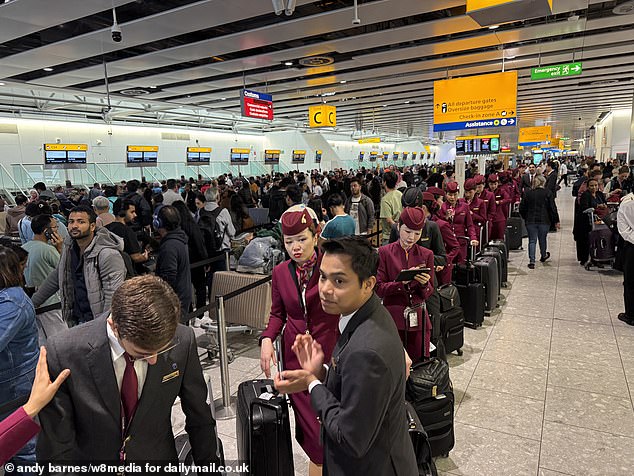A man in his 40s has been arrested over a cyber attack that crippled Heathrow and other European airports over the weekend.
The UK National Crime Agency (NCA) said the suspect was detained in West Sussex on Tuesday on suspicion of Computer Misuse Act offences, and released on conditional bail.
Thousands of passengers faced disruption at multiple airports including Heathrow, Brussels – where half of all flights were cancelled – Berlin, Dublin and Cork.
The target of the cyber offensive was automated check-in and boarding software, MUSE, which is supplied by American firm Collins Aerospace and used by airlines globally.
Hundreds of flights were cancelled or delayed at airports across Europe. In Brussels and Berlin cancellations and delays are ongoing.
Passengers on flights that did take off were left in three-hour long queues at Heathrow, which advised its customers to check the status of their trip before travelling.
Some airports were forced to resort to boarding passengers manually, with delays not helped by major events such as the Berlin marathon, which left the German airport dealing with more passengers than usual.

Thousands of air passengers faced chaos on the weekend after hundreds of flights were delayed at Heathrow (pictured) as a suspected cyber-attack crippled its electronic check-in and boarding facilities

The same strike left Brussels airport (pictured) paralysed, with half of all flights being cancelled

There were also disruptions at Berlin (pictured), Dublin and Cork – and there are warnings the turmoil could continue for days
The European Commission, which manages airspace across Europe, said it is monitoring the situation but added there were no signs the alleged cyber attack was ‘widespread or severe’.
As the National Cyber Security Centre – the public-facing arm of GCHQ – launched an investigation on Friday night, experts said the attack could be linked to pro-Russia groups.
They pointed out the attack came hours after Russian jets breached NATO airspace by entering Estonia’s skies and flying over its sovereign territory for 12 minutes.
Collins Aerospace is a major supplier of the Ukrainian military.
Deputy director Paul Foster, head of the NCA’s National Cyber Crime Unit, said: ‘Although this arrest is a positive step, the investigation into this incident is in its early stages and remains ongoing.
‘Cybercrime is a persistent global threat that continues to cause significant disruption to the UK.
‘Alongside our partners here and overseas, the NCA is committed to reducing that threat in order to protect the British public.’
The cyber attack hit major airports right before a busy September weekend of travel.
Disruption began on Friday night and continued throughout Saturday and into Sunday, with flights cancelled or delayed as the impacted airlines had to carry out check-in and boarding operations manually.
Passengers due to fly from Heathrow’s Terminal 4 said they were met with queues, delays and confusion as to whether they would be able to make their planned trips.
Brussels Airport saw 50 outbound flights cancelled on Sunday, and nearly another 140 on Monday.
On Wednesday, the airport announced it was expecting ‘limited disruption’, but that some flights would still be delayed or cancelled.
Berlin Airport also reported ongoing issues and urged customers to use online check-in before arriving.
Parent company RTX said on Friday night: ‘We have become aware of a cyber-related disruption to our MUSE software in select airports. We are actively working to resolve the issue and restore full functionality to our customers as quickly as possible.’
This article was originally published by a www.dailymail.co.uk . Read the Original article here. .

